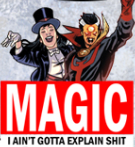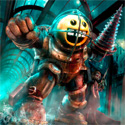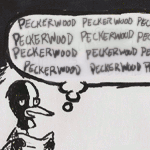|
I wonder how many times the Rocinante crew puts stuff in the recycler in the Expanse books.
|
|
|
|

|
| # ? Jun 4, 2024 20:39 |
|
BravestOfTheLamps posted:I don't like fantasy. Sorry, this seemed like it would probably be incredibly boring so I skipped it and also fixed it for you at the same time.
|
|
|
|
RentACop posted:I'm not going to lie I was expecting it to actually not be that common and just be a collective false memory but gatdamn It's pretty dramatic how much all that stuff decreases in the Sanderson-written books. He keeps some of it up for flavour but less than half the smoothing and such.
|
|
|
|
RentACop posted:I'm not going to lie I was expecting it to actually not be that common and just be a collective false memory but gatdamn Nah, I'm in the middle of reading the series and it's all over the place (as those numbers suggest). Hell I'm surprised they didn't run a count on arms folding, which also seems to be happening constantly.
|
|
|
|
I just want to thank everyone for all the book suggestions. I'm gonna be preoccupied for a while. However, I wanted to get the insight of more knowledgeable people than myself on something. i was recently reading the t Libertarianism thread and they were discussing its uncomfortable popularity in sci-fi. Now any time uncomfortable political themes is brought up with regards to science fiction literature, Robert Heinlein is invoked. Starship Troopers was fascist and then he wrote some later book that is apparently a Libertarian utopia. Well I went and did some Googling to get other hot takes on this. There is apparently a whole award for Libertarian Science Fiction. Has anyone read this Niven guy because one of his books - going just by the basic description I read - was like WTF. Apparently LA descends into race riots (oh dear) and so they have to build a place for all the good people to live. (OH DEAR) There is some highly confusing overlap between "I want no government in my life" and "I want to fantasize about the days of yore when the government could stab me in the face with impunity." Anyway, in the course of my researches, I came upon an article on JSTOR titled "Fascism and Science Fiction." I had to buy a whole issue of Science Fiction Studies because apparently JSTOR doesn't actually let you read all the articles on the site, which defeats the whole goddam point of the site in my view but anyway.... Aaron Santesso posted:Fascism may be understood on one level as a narrative, one that fascist politicians and artists alike have used innumerable times over the past century. For decades, fascist literature—from the work of Gabriele D’Annunzio through the Nazi Schollen-roman [“novel of the soil”] to the journalism of Robert Brasillach—emphasized the “superior” class at the top of society, the importance of race, the nobility of sacrifice in defense of one’s people, and so on—these ideas were connected into a recognizable story about decline and rebirth. It is only natural that this story was told most clearly and forcefully in imaginative literature; by the 1930s, there was a certain mass-production feel to such works. “Blubo” (“blood and soil”) novels—the German fascist equivalent of pulp fiction—were churned out with regularity, always telling more or less the same story revolving around praise of traditional lifestyles and the perils of international urbanism and Jewish bankers. 19 The fascist author has his or her goals and a familiar strategy by which to pursue them: to outline the threat of the alien as opposed to the pure; to emphasize the necessity of unifying and fighting against the threat; to promote “action” as the most appropriate response to any crisis; to celebrate those who are willing to sacrifice for the greater good of the people; to describe the elite class and great leader who will emerge to lead the masses in their struggle. Indeed, we might reduce virtually all of these works to one relatively simple master-plot: a once-great society is now threatened and degraded by inhuman, impure, and hive-minded outsiders (who often blend into the society, corrupting it from the inside); a special, enormously gifted (to the point of being virtually superhuman) individual rises up and begins to fight back in order to restore the society’s original purity and greatness; this fight requires a steely society- wide resolve, a restriction if not outright rejection of democracy, and ideally militarization. The ideal society is imagined as recapturing earlier values and independence—but, ironically, that restoration will be pursued via the use of new, balance-altering technology Mr. Santesso makes it clear he is not attacking individual authors like Heinlein. Rather his point is to address whether or not a genre can have political inclinations written into its very tropes. He brings up epic poetry and states they naturally lend themselves to imperialism. He is contesting the (apparently very popular) idea that science fiction is inherently Progressive. quote:That conservative pulp sf is partly aligned with fascist thought is plain enough. More interesting and more subtle is the way this basic structure, and these familiar tropes, begin to infect other strains of writing influenced by pulp sf, so that even consciously progressive science fiction unintentionally offers up pseudo-fascist patterns and themes. A high-profile example is Olaf Stapledon’s Odd John (1935). The title character is a superman of the highest order—as a small boy he reminds those who watch him “of a little old man with snowy hair condescending to play with young gorillas” (19). The young John Wainwright gradually becomes more insistent on his supremacy—beating and humiliating a friend, for example, and causing the friend to confess that he recognized John’s “right” to do so, given his own evident inferiority. While still young, John sniffs out other similarly superior individuals, forming a team of “supernormals” who offer each other “companionship of a calibre Apparently "Heinlein is a fascist" has just been an idea in everyone's head for decades. quote:This kind of labeling was at work at least since the 1940s (Under Cover, etc.), but it was logical that the seeking out and condemning of far-right overtones had its heyday during the counterculture era of the 1960s, when several authors spoofed the political overtones of earlier pulp sf—the most famous such parody being Norman Spinrad’s Iron Dream (1972). Spinrad imagined an alternate history in which Hitler failed to become a fascist dictator, and instead, naturally enough, became a science-fiction writer. Hitler’s sf “novel” (“Lord of the Swastika”) contains all the familiar tropes—familiar to both fascism and sf: an obsession with “freakish,” “monstrous,” and collectivized outsiders, with futuristic technology as a sign of enlightenment (or, alternatively, as proof of “alien” decadence and weakness), with the construction of a myth-system that places one chosen culture at its center, and so on. As in other such works, a utopian society is threatened with invasion and can only be saved by a superman figure (Spinrad’s hero “Trueman”)—indeed, the hero unites an entire race of “tall, blond, blue-eyed supermen” (220). Ursula Le Guin quickly identified it as a parody of “the kind of story best exemplified by Robert Heinlein, who believes in the Alpha Male, in the role of the innately (genetically) superior man, in the heroic virtues of militarism, in the desirability and necessity of authoritarian control, etc.” (“On Norman Spinrad” 41). Speaking of Le Guin.... quote:Le Guin is indeed an intriguing case: she has made her name by writing anti-fascist pieces, often parodying Gernsbackian hard sf—but she herself dwells, in more than one work, on the idea that a “special” individual might emerge, reconnect with the traditional ways, enlighten those oppressed by new, foreign ideology, and, emboldened by sacred authority and the power of the land, lead the people to rise up against the impure outsiders and their foreign concepts. In The Telling (2000), to take one example, we are presented with a planet corrupted by an alien ideology (collectivist and bureaucratic, and likened to the “communocapitalism” of twentieth-century Earth). The cities have been transformed into hives of conformity, with everyone wearing official uniforms and patronizing government shops—a dreary existence lightened only by official gymnastic displays (“hundreds of tiny children in red uniforms kicking and jumping in unison to shrill cheery music” [29]). Urban party “officials” and “bureaucrats” have set out to root out “reactionary ideology” (212) in the I find this absolutely fascinating. It's kind of that whole Horseshoe Theory thing. To be Leftist is, at least in my mind, to be anti-Imperialist. Consequently this leads to a sort of Nativism which is a concept usually associated with the Right. Native Americans and the like are the poor victims of evil foreigners and we should celebrate how great they were before they were brtually destroyed. Fighting off the evil hordes for the sake of a pure, unsullied people is a narrative that fits very snugly both the Left and the Right. To conclude: quote:Given his influence on progressive sf criticism, we may give the last word to Jameson, and in particular his celebration of the Brechtian notion of plumpes Denken (“crude thinking”), which he defines as the postulate that even the most subtle, academic, or experimental “neo-Marxist” works must contain a core element of “crude” or “vulgar” Marxism in order to qualify as “Marxist” at all. Jameson alludes to plumpes Denken in order to make a point about science fiction: “Something like this may have its equivalent in SF, and I would be tempted to suggest that even within the most devoted reader of ‘soft’ SF—of sociological SF, ‘new wave’ aestheticism, the ‘contemporaries’ from Dick to the present—there has to persist some ultimate ‘hard-core’ commitment to old-fashioned ‘scientific’ SF for the object to preserve its identity and not to dissolve back into Literature, Fantasy, or whatever” (Jameson 245). Might it also be the case that the fascist energies and ideas of pulp sf are precisely the kind of identity-confirming “core” or definitional element that makes it possible to speak of “science fiction,” even when discussing literary, progressive sf? It is understandable that progressive critics would wish to distance themselves from both the aesthetics and the politics that accrued to a generation of stories featuring scenarios of the Golden Races vs. the Scaly Ones variety. But to deny that politics altogether, to claim that it belongs only to the past, is to evade a serious investigation of what makes the genre work, what gives it its identity and indeed its appeal. It is, ultimately, a denial of “science fiction” itself as a genre worthy of discussion, for surely the point of genre criticism is to identify and trace the various constitutional energies, themes, and plots that animate a form and in doing so account for all its variant strains and trends, not just the ones that accord well with a narrow set of critical pieties. To speak of “science fiction” at all is to admit to certain links and ideological ties that go beyond subject and setting, leading readers and critics into unexpected places and opening up unexpected connections. One cannot simply disown unwanted relatives or pretend not to recognize their features when they pop up in later generations. It is, indeed, precisely those ancestral presences—sometimes odd, sometimes eccentric, sometimes distasteful—that give science fiction its remarkable diversity and continuing vitality. I found this a rather illuminating read. However I've read tragically little sci-fi. I wanted to see what more informed people think. NikkolasKing fucked around with this message at 02:06 on Apr 3, 2017 |
|
|
|
Grimson posted:Sorry, this seemed like it would probably be incredibly boring so I skipped it and also fixed it for you at the same time. You ain't wrong.
|
|
|
|
I only read one set of books by Niven Mote in Gods Eye which I think is considered one of the sci-fi genre's classics and it was pretty good.
|
|
|
|
My favorite Larry and Jerry book is THE LEGACY OF HEOROT wherein a strong, manly man survivalist guy saves a space colony from a hungry horde of turbo alligators. Also it's been a long time since i read it but i remember the authors making a big deal about how his girlfriend used to be a genius biologist but cryosleep made her retarded.
|
|
|
|
I think I've said in this thread before that Jerry Pournelle is a bad influence on Niven, and I think it's mostly Jerry's libertarianism that tends to come to the fore when they write together, not so much when Niven is writing solo. Oath of Fealty (the LA one - actually mostly set in an "arcology" in the middle of LA) is particularly bad. Niven on his own wrote the short story "Cloak of Anarchy" which is arguably anti-libertarian in tone. That said, the Niven/Pournelle Mote in Gods Eye is worth it at least for the ideas. andrew smash posted:My favorite Larry and Jerry book is THE LEGACY OF HEOROT wherein a strong, manly man survivalist guy saves a space colony from a hungry horde of turbo alligators. Also it's been a long time since i read it but i remember the authors making a big deal about how his girlfriend used to be a genius biologist but cryosleep made her retarded. No discussion of libertarianism in SF is complete without mentioning A.E. van Vogt's The Weapon Shops of Isher. Hobnob fucked around with this message at 06:51 on Apr 3, 2017 |
|
|
|
Wasn't there some weirdass book out a while back (i.e. like, 80s or so) that was about an asteroid headed towards earth but it turns out it was populated by ALIENS! but then it turned out they were some offshoot of ralph nader followers who wanted to bring libertarianism to the world?
|
|
|
|
Stupid_Sexy_Flander posted:Wasn't there some weirdass book out a while back (i.e. like, 80s or so) that was about an asteroid headed towards earth but it turns out it was populated by ALIENS! but then it turned out they were some offshoot of ralph nader followers who wanted to bring libertarianism to the world? aeon or eon or something it was good.
|
|
|
|
one of my favorite space fighting scenes in there
|
|
|
|
space libertarianism is dumb read space communism instead (culture and noon universe and idk what else?)
|
|
|
|
either of them can work when you're writing sci-fi because technology can be used to address problems in applying either. perhaps those who write one variant tend to be less appealing as authors but there's nothing inherently wrong with either idea.
|
|
|
|
Grimson posted:Sorry, this seemed like it would probably be incredibly boring so I skipped it and also fixed it for you at the same time. My argument is that HTK is bad because of terrible prose and ideology, which you've here equated with all fantasy. It's not really surprising at all that you'd do so. Fans tend to implicitly assume/acknowledge that fantasy is a fundamentally inferior genre that won't survive comparison to "real" literature. A really good example of this is one review of The Name of the Wind that praised the book as the "David Copperfield of fantasy," while A Song of Ice and Fire filled the role of "War and Peace of fantasy". That kind of thought is exemplary of that mindset of inferiority: it's an unstated acknowledgement that those books don't stand comparison to their non-fantasy counterparts, and genuine comparison is avoided with the qualifier that they're genre fantasy and not equal to the David Copperfields or Wars and Peaces of "real literature". It's compartmentalization, almost. BravestOfTheLamps fucked around with this message at 09:14 on Apr 3, 2017 |
|
|
|
Stupid_Sexy_Flander posted:Wasn't there some weirdass book out a while back (i.e. like, 80s or so) that was about an asteroid headed towards earth but it turns out it was populated by ALIENS! but then it turned out they were some offshoot of ralph nader followers who wanted to bring libertarianism to the world? That's Eon by Greg Bear and your recollection is only partly accurate. The ALIENS! were far-future post-scarcity post-apocalyptic post-humans; the asteroid had started out as a slower-than-light colony ship built by the civilization that rebuilt itself after World War 3, and in their culture Ralph Nader had become a sort of prophet figure, seen as having warned against the technology that had almost wiped out humanity. Then at some point in the voyage the post-humans had built some sort of transdimensional tunnel and more or less abandoned the asteroid itself in favour of loving off way down that tunnel; but as a side effect the asteroid had been whipped back through spacetime and ended up back in Earth orbit shortly before WW3, and in fact in the new version of history its appearance was the thing that triggered WW3 because the US and the Soviets both went after it to grab the amazing future technology and poo poo; this was written back in the day when such a confrontation was largely seen as inevitable. I don't really recall anything about libertarianism though it's been years since I read it.
|
|
|
|
NikkolasKing posted:Has anyone read this Niven guy what But yeah, Niven has his issues but generally doesn't go Full Libertarian. He's written a lot, though; it probably wouldn't be hard to find some stories that can be read in support for it (or vice versa, like the aforementioned "Cloak of Anarchy"*). IMO, he's great at coming up with cool ideas but not so hot at plotting or characters, so his novels tend to be relatively weak but he really shines in short stories, which give him enough room to showcase one or two cool ideas without becoming a slog. * Which basically boils down to a totally unregulated libertopia is awesome -- as a city park, with wardens keeping watch to make sure "no initiation of force" is actually adhered to and with an actual functioning society outside it that people can return to when it gets boring or scary. Take away #1 and people get a lot more eager to take advantage of #2 -- if they can.
|
|
|
my bony fealty posted:space libertarianism is dumb read space communism instead (culture and noon universe and idk what else?) Literally the book of the month right now I try to bring culture to you people
|
|
|
|
|
I need someone to convince me to finish Book of the New Sun. I'm nearly finished with the second book and I'm about to throw in the towel. The only reason I haven't already is the series' reputation as a classic. My problems with the series thus far have been: 1. I don't care about the story (because, through the first two books there doesn't seem to be any). Most of the characters other than the protagonist are shallow, especially the women. 2. Wolfe's prose isn't strong enough to carry the books for me. Unlike some negative reviews I've seen, I am not put off by his complex language. I find it fun, actually, to decipher what his neologisms actually refer to. However, he meanders frequently. The lack of a strong plot detracts from his clever language. I get that part of the appeal of the series is the fact that what seems to be a fantasy setting is actually science fiction, with robots and spaceships described how a medieval person may perceive them. However, this complexity is undone by the fact that the plot is so weak. I don't care that the character Jonas turns out to be a robot, something that should be important. 3. Going back to the women. I almost want to hand-wave Wolfe's use of women characters as "it was the 80s," and I have read so little sci-fi that I don't know if his depiction is typical of that era or an aspect of his other works, but his women are terrible. Thea/Thecla are the only interesting, complex female characters so far. Severian's relationship with Agia makes no sense; Dorcas is, so far, a mere archetype (she is literally Innocence to Severian's Death) , and Jolenta is a sex object. In fact, the part of Claw of the Conciliator that nearly made me put the book down for good was the chapter titled Jolenta, in which Severian spends the entire chapter describing Jolenta as a vain, promiscuous wench who Does Not Compare To The Other Women I Idolize and then proceeds to rape? her on a boat. In fact, can someone please tell me now whether this is rape or if Jolenta somehow tricks Severian into loving her while she's 'asleep'. Wolfe literally writes "See seemed half drugged, whether by some soporific ... or merely by the fatigue induced by our walk." And Jolenta's eyes were "hardly open" when he begins kissing her and undressing her. Basically that chapter really bothered me and I hope there's an explanation more satisfying than Severian actually did rape her/Severian is an "unreliable narrator" so we don't actually know what happened! Essentially, "I hope there's a satisfying explanation" is my re-occurring mode of thought through the first two books. The reviews I have seen that are most critical of the series point out the flaws of the 2nd book; does the series noticeably improve? Is there a payoff for all of the obfuscation/trickery Wolfe employs? Is this a series best enjoyed during its time, or is it as timeless as people seem to think? After the 4th book, am I going to look back and think "it was all worth it!" or will I just be annoyed I didn't see the writing on the wall after the 2nd book disappointed me so much? I really enjoyed 75% of the first book (thought the final quarter was strange, but overall I was excited to continue the series) but Claw has just been one huge slog. It certainly doesn't help that the book contains a lengthy "story-within-a-story" Severian reads to Jonas that seems to have no significance to Claw that seems to break the narrative for no purpose. tl;dr: if I'm not in love with Book of the New Sun after two books, should I bother finishing? If there's some huge payoff I'm willing to stick with it, but I am willing to be among the very few people who just don't "get it" if everyone else loved the series throughout. I understand that it may be difficult to answer my questions without spoiling the next two books, so I would be satisfied with answers like "I thought it was difficult, too, but the payoff is indeed worth it" or just "Yes, dumbass, finish it." Thanks.
|
|
|
Disillusionist posted:I need someone to convince me to finish Book of the New Sun. I'm nearly finished with the second book and I'm about to throw in the towel. The only reason I haven't already is the series' reputation as a classic. I think that's ultimately a personal question. You raise valid points. Severian is highly unreliable and may be a horrible person. The thing about BotNS is that Wolfe was converting to Catholicism as he wrote it, so the whole thing is convoluted as gently caress, and you basically need to refer to external sources to understand anything that happens. There is a plot, it's just unintelligible without outside references. I think it's still worth reading but it seems to me like Wolfe is more a writer for other writers than a writer for popular audiences. Technically impressive and interesting but best approached more for the form than the content.
|
|
|
|
|
Gene Wolf is a writer that I love to read about but don't enjoy reading very much, personally. I am not a very intensive reader when I read for pleasure, and you pretty much have to bring a hacksaw with you to New Sun.
|
|
|
|
You're not supposed to think Severian is a good person. He's a flawed messiah for a worn out world that has long given up on the very idea of eschatology. He's lying through his teeth to support his own historical and religious narrative. In terms of plot as "events occurring in sequence" I would note that Sword of the Lictor and Citadel of the Autarch move way faster than Shadow/Claw. That said Gene Wolfe's writing absolutely has issues with women and if that's a dealbreaker for you in literature then it's not an invalid one.
|
|
|
|
Hieronymous Alloy posted:Literally the book of the month right now and you succeed, never a bad time to do a Hainish Cycle read quote:tl;dr: if I'm not in love with Book of the New Sun after two books, should I bother finishing? If there's some huge payoff I'm willing to stick with it, but I am willing to be among the very few people who just don't "get it" if everyone else loved the series throughout. Keep going if you can. There is a payoff, and there is a satisfying conclusion, and there is a strong plot underlying everything; it's just very well hidden and hard to piece together. Part of the problem is that Severian doesn't really know what's going on. Not just that he's unreliable, he really does not know what's happening to him or why. You absolutely won't "get it" the first time through though, no one does. It's so convoluted that the publisher asked Wolfe to write a sequel clarifying wtf happened and what the actual ending of the story is, and thus we got Urth of the New Sun. There are a lot more story-within-the-story parts, and they mostly do have some bearing on the plot, even if it doesn't seem like it. The story isn't told linearly, and much of it isn't really told at all but left to the reader to infer. If you do keep reading, don't expect to finish the fourth book and go "ah ha, I get it now" because you won't and you probably won't even if you read Urth of the New Sun. It is ultimately also a story that relies a lot on personal interpretation. People still argue about it on a 90s mailing list, 30+ years after it came out; it's a book that has generated at least 2 full-length books of analysis, that don't agree with each other at all (though most people agree one of those is total trash). Wolfe did suck at writing female characters, yeah (he got better at least!). There is more to Dorcas and Jolenta than just shallow archetypes but it's definitely a weak point of the novel. A lot of people think Severian embellishes his sexual history, which ain't hard to believe given that he's like 18 when the events are happening and is in a position where it's probably advantageous for him to do that.
|
|
|
|
NikkolasKing posted:However, I wanted to get the insight of more knowledgeable people than myself on something. i was recently reading the t Libertarianism thread and they were discussing its uncomfortable popularity in sci-fi. Now any time uncomfortable political themes is brought up with regards to science fiction literature, Robert Heinlein is invoked. Starship Troopers was fascist and then he wrote some later book that is apparently a Libertarian utopia. Well I went and did some Googling to get other hot takes on this. There is apparently a whole award for Libertarian Science Fiction. Has anyone read this Niven guy because one of his books - going just by the basic description I read - was like WTF. Apparently LA descends into race riots (oh dear) and so they have to build a place for all the good people to live. (OH DEAR) There is some highly confusing overlap between "I want no government in my life" and "I want to fantasize about the days of yore when the government could stab me in the face with impunity." The genre is rotten with libertarianism. The award you're thinking of is the 'Prometheus' award, and probably the biggest name in the explicitly-libertarian genre (as opposed to the implicitly-libertarian kind) is L.Neil Smith, here are some quotes https://en.wikiquote.org/wiki/L._Neil_Smith and here are some blurbs https://www.theadvocates.org/libertarianism-101/libertarian-celebrities/neil-smith/ (and there's this: http://www.ncc-1776.org/tle2013/tle734-20130818-06.html )
|
|
|
|
Number Ten Cocks posted:I wonder how many times the Rocinante crew puts stuff in the recycler in the Expanse books. I'm sure when they do, it's in companionable silence...
|
|
|
|
my bony fealty posted:space libertarianism is dumb read space communism instead (culture and noon universe and idk what else?) One of the two alternate endings to Ken MacLeod's Fall Revolution series features Space Libertarians arriving on the scene, being warned by the Space Communists not to deal with the post-Singularity AIs because they will eat their minds, the Space Libertarians say "no, no, its cool, our advanced information technology produced by the invisible hand of the free market will protect us from all harm', they get their minds eaten, and then Space Communist nuke the lot of them.
|
|
|
|
BravestOfTheLamps posted:My argument is that HTK is bad because of terrible prose and ideology, which you've here equated with all fantasy. I actually don't think that because of that, I think that because your entire contribution to this thread is making GBS threads on the books talked about in this thread, hope this helps! More than that, I think you have mistaken your OWN critical acclaim in the Name of the Wind thread for having something interesting to say.
|
|
|
|
Grimson posted:I actually don't think that because of that, I think that because your entire contribution to this thread is making GBS threads on the books talked about in this thread, hope this helps!
|
|
|
|
tonytheshoes posted:I'm sure when they do, it's in companionable silence... ... broken by the hum of the air systems.
|
|
|
|
Disillusionist posted:tl;dr: if I'm not in love with Book of the New Sun after two books, should I bother finishing? If there's some huge payoff I'm willing to stick with it, but I am willing to be among the very few people who just don't "get it" if everyone else loved the series throughout. I'd say it's a good book with an interesting story and certainly worth finishing. (The Claw of the Conciliator is the low point, btw.) There's a Gene Wolfe thread around, you might find peoples' posts there (including mine) interesting. To address your three points: 1. Yes, the structure is rather picaresque, and it's not a plot-heavy book; nonetheless I found the ending very satisfying. 2. You don't actually complain about his prose, just structure, again. 3. No, the women aren't fantastic, although Dorcas' character makes more sense soon and other women are better characterised. Part of the issue with female characters is point of view, consider in the man-apes part how easily Agia manipulates Severian - if this wasn't narrated from Severian's point of view, it would seem ridiculous. Hieronymous Alloy posted:I think that's ultimately a personal question. You raise valid points. Severian is highly unreliable and may be a horrible person. Severian isn't nearly as unreliable as people say; he lies mostly to other characters in the text, not often or majorly to the reader. The convoluted sf plot stuff (and boy is some of the plot/minor detail work convoluted!) isn't really necessary to understanding it, either. Grimson posted:I actually don't think that because of that, I think that because your entire contribution to this thread is making GBS threads on the books talked about in this thread, hope this helps! Hundred Thousand Kingdoms is really bad, though. NikkolasKing posted:fascism Yo I enjoyed reading this post, still thinking about a reply though. Also can you get a myJSTOR account? I have one, I think they let any old riff raff in.
|
|
|
|
Safety Biscuits posted:Yo I enjoyed reading this post, still thinking about a reply though. Also can you get a myJSTOR account? I have one, I think they let any old riff raff in. I'm glad you enjoyed it and I look forward to your response. As for JSTOR, I have an account. It's a 10 day free trial thing so maybe that's why I can't read some of the articles or books listed.
|
|
|
|
For anyone interested, Mark Lawrence's new book "Red Sister" is out, as is the new Alex Verus book by Benedict Jacka. That's my days off sorted.
|
|
|
|
A human heart posted:he's allowed to have a negative opinion about the books talked about in this thread, and to express that in the thread
|
|
|
Safety Biscuits posted:
Ah, ok. I was going by an old Gaiman quote I read somewhere about Wolfe undergoing a religious experience while writing the series, but it was vagueand so is my memory of it and I can't find it again right now. It might have meant he converted between strains of catholicism or just that writing the books was a religious experience. Hieronymous Alloy fucked around with this message at 05:35 on Apr 4, 2017 |
|
|
|
|
Hieronymous Alloy posted:Ah, ok. I was going by an old Gaiman quote I read somewhere about Wolfe undergoing a religious experience while writing the series, but it was vague and I can't find it again right now.
|
|
|
Nakar posted:Enlightenment came to Gene Wolfe on the Pringles assembly machine design team meeting. To be fair that is a goddam inspired bit of packaging design
|
|
|
|
|
Hieronymous Alloy posted:Ah, ok. I was going by an old Gaiman quote I read somewhere about Wolfe undergoing a religious experience while writing the series, but it was vagueand so is my memory of it and I can't find it again right now. It might have meant he converted between strains of catholicism or just that writing the books was a religious experience. iirc he wasn't super devout, and writing the book helped him work through his feelings, and thus become turbo-Catholic.
|
|
|
|
neongrey posted:iirc he wasn't super devout, and writing the book helped him work through his feelings, and thus become turbo-Catholic. Hieronymous Alloy posted:Ah, ok. I was going by an old Gaiman quote I read somewhere about Wolfe undergoing a religious experience while writing the series, but it was vagueand so is my memory of it and I can't find it again right now. It might have meant he converted between strains of catholicism or just that writing the books was a religious experience. That sounds about right. I have a vague memory of him saying that one of the reasons he wrote it was to question his beliefs.
|
|
|
|
Grimson posted:I actually don't think that because of that You've merely said it. Grimson posted:More than that, I think you have mistaken your OWN critical acclaim in the Name of the Wind thread for having something interesting to say. Oh, I know I have lots of interesting thing to say, but I have no illusions that people don't react well when criticism is turned on things they do like.
|
|
|
|

|
| # ? Jun 4, 2024 20:39 |
|
BravestOfTheLamps posted:
lol Sorry I should offer more than 'lol' as a response so I'll offer this: If a bunch of other people think your posts are boring and you think they're interesting, that's an opportunity to develop your skills of self evaluation. Chairchucker fucked around with this message at 09:15 on Apr 4, 2017 |
|
|







































